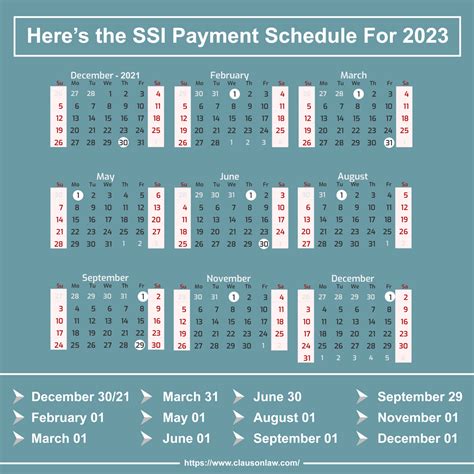
SSI recipients will receive their June Supplemental Security Income (SSI) payments early, on May 31, due to the June 1st falling on a Saturday. The Social Security Administration (SSA) has also released the 2025 payment schedule, allowing beneficiaries to plan accordingly. This early payment affects only the timing of the June SSI disbursement and does not indicate any change in the overall benefit amount or eligibility criteria.
The early payment is a standard procedure when the first day of the month falls on a weekend or a federal holiday. According to the SSA, “When the normal payment date falls on a Saturday, Sunday, or Federal holiday, the payments are made on the prior business day.” This ensures that beneficiaries receive their funds without interruption.
Early June Payment Details
The primary reason for the early payment is to accommodate the weekend. The SSA typically disburses SSI payments on the first day of each month. However, to avoid any delay, payments are issued on the preceding business day when the 1st falls on a Saturday, Sunday, or federal holiday. For June 2024, because June 1st is a Saturday, the SSI payment will be made on Friday, May 31st.
This early payment only impacts SSI recipients. Social Security retirement, disability, and survivor benefits are typically paid on different schedules, based on the beneficiary’s birth date.
2025 Payment Schedule
The Social Security Administration (SSA) has released the 2025 schedule for SSI payments, allowing recipients to anticipate their payment dates throughout the year. This schedule takes into account weekend and holiday adjustments, ensuring beneficiaries know when to expect their payments.
Here’s a tentative overview of the 2025 SSI payment schedule, noting that the SSA officially publishes the full schedule on its website:
- January 2025: January 1st (Holiday adjustment: Payment made December 31, 2024)
- February 2025: January 31st (Due to being a weekend, payment made January 31st)
- March 2025: March 3rd (Due to being a weekend, payment made February 28th)
- April 2025: April 1st
- May 2025: May 1st
- June 2025: June 2nd (Due to being a weekend, payment made May 30th)
- July 2025: July 1st
- August 2025: August 1st
- September 2025: September 1st
- October 2025: October 1st
- November 2025: October 31st (Due to being a weekend, payment made October 31st)
- December 2025: December 1st
Note: This is a projected schedule based on standard practices. Always refer to the official SSA website for the most accurate and updated information.
Understanding Supplemental Security Income (SSI)
Supplemental Security Income (SSI) is a needs-based program administered by the Social Security Administration (SSA). It provides monthly payments to adults and children with limited income and resources who are either aged (65 or older), blind, or disabled. SSI is distinct from Social Security retirement, disability, or survivor benefits, which are based on a person’s prior work history and contributions to the Social Security system.
SSI is funded by general tax revenues, not Social Security taxes. This means that eligibility for SSI is not dependent on having worked or paid into the Social Security system. Instead, it focuses on financial need and disability or age criteria.
Eligibility Requirements
To be eligible for SSI, individuals must meet specific criteria related to age, disability, income, and resources.
- Age: Individuals must be age 65 or older, blind, or disabled.
- Disability: For adults under age 65, disability is defined as the inability to engage in any substantial gainful activity (SGA) due to a medically determinable physical or mental impairment that has lasted or is expected to last for at least 12 months or result in death.
- Income: SSI has strict income limits. The SSA considers both earned income (from work) and unearned income (such as Social Security benefits, pensions, or gifts). The amount of income an individual can receive and still be eligible for SSI varies, but it is generally quite low.
- Resources: SSI also has resource limits. Resources include things like bank accounts, stocks, bonds, and other assets that can be converted to cash. The resource limit for an individual is \$2,000, and for a couple, it is \$3,000. Certain items, such as the home you live in and one vehicle, are typically excluded from resource calculations.
Payment Amounts
The maximum federal SSI payment amount changes each year, based on cost-of-living adjustments (COLA). These adjustments are tied to the Consumer Price Index (CPI) and are intended to help SSI recipients maintain their purchasing power in the face of inflation.
For 2024, the maximum federal SSI payment is \$943 per month for an individual and \$1,415 per month for a couple. However, many SSI recipients receive less than the maximum amount because the SSA considers other income they may have.
How to Apply for SSI
Individuals who believe they may be eligible for SSI can apply online, by phone, or in person at a local Social Security office. The application process involves providing detailed information about income, resources, living arrangements, and medical conditions (if applying based on disability).
The SSA will review the application and may request additional information or documentation. If the application is approved, the individual will begin receiving monthly SSI payments.
Impact of Early Payments
While the early payment of SSI benefits in months where the 1st falls on a weekend or holiday is a routine procedure, it can still have a significant impact on recipients. Many SSI beneficiaries rely on these payments to cover essential expenses such as rent, food, and utilities. Receiving the payment a day or two early can help them avoid late fees or other financial penalties.
However, it’s also important for recipients to manage their funds carefully, as the early payment means they will have a longer period until their next SSI payment. Budgeting and financial planning are crucial for ensuring that they can meet their needs throughout the month.
The Role of the Social Security Administration
The Social Security Administration (SSA) plays a critical role in administering both Social Security and SSI programs. The SSA is responsible for determining eligibility, calculating payment amounts, and disbursing benefits to millions of Americans each month.
The SSA also provides a wide range of services and resources to beneficiaries, including information about Social Security and SSI programs, assistance with applying for benefits, and support for individuals with disabilities. The SSA website (www.ssa.gov) is a valuable resource for anyone seeking information about Social Security or SSI.
The Future of SSI
The SSI program is an essential safety net for millions of vulnerable Americans. However, it also faces challenges, including rising costs and debates about eligibility criteria and payment amounts. As the population ages and the number of people with disabilities increases, the demand for SSI benefits is likely to grow.
Policymakers will need to address these challenges to ensure that the SSI program remains sustainable and effective in meeting the needs of those who rely on it. This may involve reforms to eligibility rules, payment formulas, or funding mechanisms.
Importance of Financial Planning
Regardless of the specific challenges or reforms facing the SSI program, financial planning remains essential for SSI recipients. Given the limited income and resources available to most beneficiaries, careful budgeting and saving are crucial for managing expenses and building financial security.
There are many resources available to help SSI recipients with financial planning. These include government agencies, non-profit organizations, and financial advisors who specialize in working with low-income individuals. By taking advantage of these resources, SSI recipients can learn how to manage their money more effectively and improve their overall financial well-being.
Other Resources for SSI Recipients
In addition to SSI payments, many recipients may also be eligible for other forms of assistance, such as food stamps (SNAP), Medicaid, and housing assistance. These programs can provide valuable support for meeting basic needs and improving quality of life.
SSI recipients should explore all available resources and apply for any programs for which they may be eligible. Information about these programs can be found on government websites, at local social service agencies, and through non-profit organizations.
Community Support and Advocacy
Community support and advocacy play a vital role in ensuring that SSI recipients have access to the resources and services they need. Many organizations provide assistance with applying for benefits, navigating the Social Security system, and advocating for the rights of people with disabilities and low-income individuals.
By working together, community groups and advocates can help to strengthen the SSI program and improve the lives of those who rely on it.
Staying Informed
It is essential for SSI recipients to stay informed about changes to the program, payment schedules, and eligibility rules. The Social Security Administration (SSA) provides regular updates on its website and through other channels.
Recipients can also sign up for email alerts or follow the SSA on social media to receive timely information. By staying informed, they can ensure that they are aware of any changes that may affect their benefits and can take appropriate action.
Impact of Cost-of-Living Adjustments (COLAs)
Cost-of-living adjustments (COLAs) are an important feature of the SSI program. These adjustments help to protect the purchasing power of SSI benefits by increasing payment amounts to keep pace with inflation.
COLAs are based on the Consumer Price Index (CPI), a measure of the average change over time in the prices paid by urban consumers for a market basket of consumer goods and services. The SSA calculates the COLA each year and announces the new payment amounts in the fall.
Managing Finances with Limited Resources
Living on SSI often means managing finances with very limited resources. Budgeting is essential. Creating a monthly budget that tracks income and expenses can help SSI recipients understand where their money is going and identify areas where they can save.
Prioritizing essential expenses, such as housing, food, and healthcare, is also important. Looking for ways to reduce costs, such as by using coupons, shopping at discount stores, or taking advantage of free or low-cost community resources, can help stretch limited funds further.
Seeking Assistance When Needed
It is important for SSI recipients to seek assistance when they need it. There are many resources available to help with financial planning, housing, healthcare, and other needs.
Social service agencies, non-profit organizations, and government programs can provide valuable support. Don’t hesitate to reach out for help if you are struggling to manage your finances or meet your basic needs.
Long-Term Planning
While managing day-to-day finances is important, it is also helpful for SSI recipients to engage in long-term planning. This may involve setting financial goals, such as saving for emergencies or retirement.
It is also important to plan for potential changes in circumstances, such as changes in income, health, or living arrangements. Having a plan in place can help SSI recipients navigate these changes more effectively and maintain their financial stability.
Understanding Work Incentives
The Social Security Administration (SSA) offers a variety of work incentives to encourage SSI recipients to work and become more self-sufficient. These incentives allow recipients to earn income without losing their SSI benefits entirely.
For example, the SSA excludes a certain amount of earned income from the SSI eligibility calculation. This means that recipients can work and earn money without having their SSI payments reduced by the full amount of their earnings.
The Importance of Healthcare
Healthcare is a critical need for SSI recipients, many of whom have disabilities or chronic health conditions. Medicaid provides healthcare coverage to many SSI recipients.
Medicaid covers a wide range of services, including doctor visits, hospital care, prescription drugs, and mental health services. It is important for SSI recipients to take advantage of Medicaid and other healthcare resources to maintain their health and well-being.
Navigating the Social Security System
The Social Security system can be complex and confusing. It is important for SSI recipients to understand their rights and responsibilities.
The Social Security Administration (SSA) provides a wealth of information on its website and through other channels. Recipients can also seek assistance from social service agencies, non-profit organizations, and legal aid providers.
Advocating for Your Rights
If you believe that you have been unfairly denied SSI benefits or that your benefits have been improperly reduced, you have the right to appeal. The appeals process can be complex, but there are resources available to help.
Social service agencies, non-profit organizations, and legal aid providers can provide assistance with the appeals process. It is important to advocate for your rights and ensure that you receive the benefits to which you are entitled.
The Broader Context of Poverty and Disability
The SSI program is just one piece of the puzzle in addressing poverty and disability. Many other factors contribute to these challenges, including lack of access to education, employment, and healthcare.
Addressing poverty and disability requires a comprehensive approach that includes government programs, community support, and individual effort. By working together, we can create a society that is more inclusive and equitable for all.
Looking Ahead
The SSI program is likely to continue to evolve in the years ahead. Policymakers will need to address the challenges facing the program and ensure that it remains sustainable and effective in meeting the needs of those who rely on it.
It is important for SSI recipients to stay informed about these changes and to advocate for their rights. By working together, we can ensure that the SSI program continues to provide a vital safety net for vulnerable Americans.
Frequently Asked Questions (FAQs)
1. Why am I receiving my June SSI payment early?
You are receiving your June SSI payment on May 31st because June 1st falls on a Saturday. The Social Security Administration (SSA) typically disburses SSI payments on the first day of each month. However, to avoid delays, payments are issued on the preceding business day when the 1st falls on a Saturday, Sunday, or federal holiday. This ensures you receive your funds without interruption.
2. Will the early payment affect the amount of my SSI check?
No, the early payment only affects the timing of your June SSI disbursement. It does not change the amount of your benefit. You will receive the same amount you normally do. The change is solely to ensure timely delivery due to the weekend.
3. Where can I find the official 2025 SSI payment schedule?
The official 2025 SSI payment schedule will be posted on the Social Security Administration’s website (www.ssa.gov). Once published, you can view and download the schedule for your reference. It’s advisable to check the official SSA website for the most accurate and updated information.
4. What are the basic eligibility requirements for SSI?
To be eligible for SSI, you must be age 65 or older, blind, or disabled, and have limited income and resources. The specific income and resource limits vary, but are generally quite low. For adults under 65, disability is defined as the inability to engage in any substantial gainful activity (SGA) due to a medically determinable physical or mental impairment that has lasted or is expected to last for at least 12 months or result in death.
5. Who should I contact if I have problems or questions about my SSI payment?
If you have any problems or questions about your SSI payment, you should contact the Social Security Administration (SSA) directly. You can call the SSA’s toll-free number at 1-800-772-1213, visit your local Social Security office, or access information and services online at www.ssa.gov. They can assist you with any issues related to your benefits.









